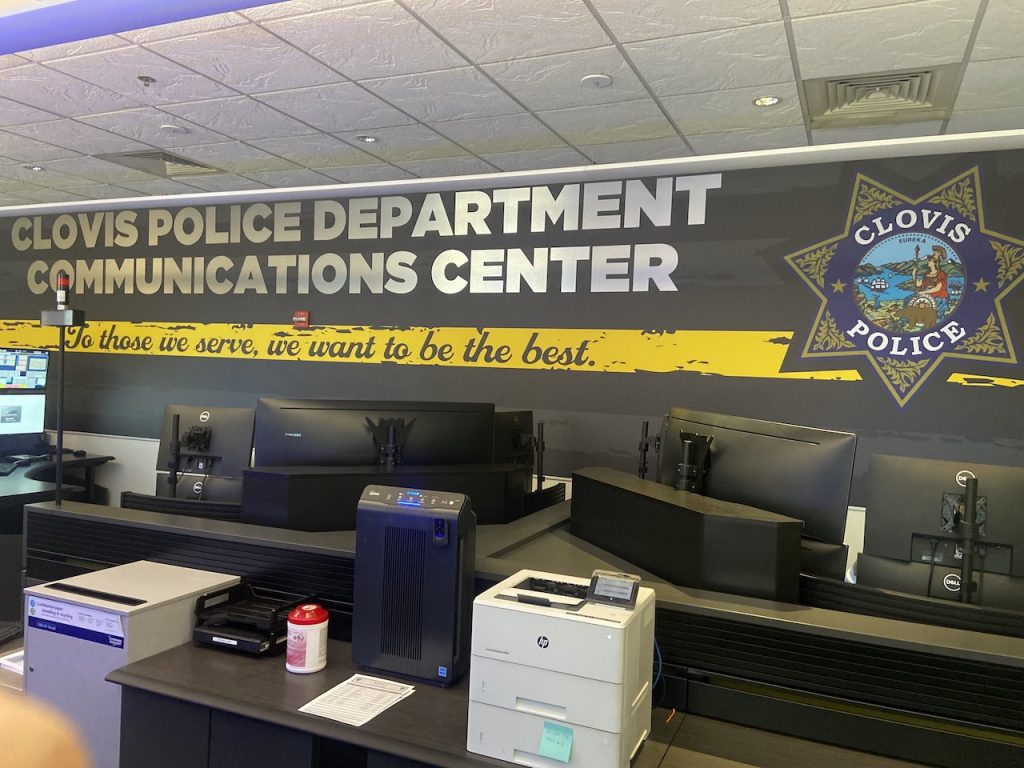
Clovis PD recently opened its brand new Clovis Police Department Dispatch Center, and although the newest setting involved mainly new furniture, the system that has been used successfully in the past by the Clovis PD Dispatch Team is still in use today.
The system that they have used inside of the 19-year-old building that they are currently housed in was used for 41,285 911 calls in 2021 along with 141,637 non-emergency calls for a total of 182,922 calls throughout 2021. A little more than halfway through 2022, (201 days to be exact), and there have been 22,283 911 emergency calls, and 79,435 non-emergency calls totalling just around 101,718 calls from the entire City of Clovis. In completing basic long division, (or using a calculator) when it comes to 101,718/201 a quotient reaches just above about 500 calls per day.
And each call goes through the dispatch center.
A dispatch center that had been long overdue for updates in comfort, sustainability and overall capability for the dispatchers who spend upwards of ten to twelve hours a day in the room. Eight identical stations with around four to seven dispatchers working at a time have been updated with standing desks allowing dispatchers the option to sit or stand at any point during their workday, as well as the option of sliding their six desktop monitors horizontally towards them or away from them. This allows for better sight advantages throughout the day.
But as mentioned, just because the furniture may have changed, it does not mean that the system dispatchers have used has changed at all.
On their radios, dispatchers are still able to dispatch calls to police officers in the field, run suspects for warrants, and handle situations like collisions usually always on one channel throughout the day. However, when specific incidents may occur such as violent acts or life threatening situations, the dispatchers and police will reserve channels for “emergency traffic,” according to Public Information Officer Ty Wood.
Upon hearing the two different types of dispatch ringtones, it was made known that one ringtone was for emergency calls and one was for non-emergency calls. But along with phone calls, dispatchers also may receive text messages detailing emergency or non-emergency situations. This is done for the hearing impaired or for possible situations in which someone in need of assistance is unable to speak at the moment. To use Text 911 simply use any text message application by texting the number 911 with an emergency message. However, this option should only be reserved for specific situations in which a caller is unable to speak, reminds Lead Public Safety Dispatcher Tiffany Viau.
Viau, who like her colleagues, is an integral part to the emergency response team, spoke about the new dispatch center. “We maintained all of the previous computer equipment and just reinstalled…[With the new setup] We feel really spoiled.” Viau also mentioned that the dispatch center frequently receives visitors and the gratitude she and her colleagues feel when those visitors walk in. “We pretty much have all the amenities that we need that other agencies aren’t as lucky [to have].”
Viau and the rest of the Clovis Police Department Dispatch Team will continue to work in their newly remodeled headquarters for time to come. Ty Wood also described a separate room that can be used as extra space for the dispatchers, and with as many calls as they get, they can certainly use the space.
The way in which Clovis Police Department’s Dispatch Center is set up is simple, and always with the point in mind to save lives throughout the city. It is a positive that the dispatchers have the attainability to be so successful and have a safe and comfortable work environment to do so in. But being attainable for dispatchers is only half the battle. A dispatcher must need to know how to listen and decipher bits of information in times of crisis for someone on the other line.








